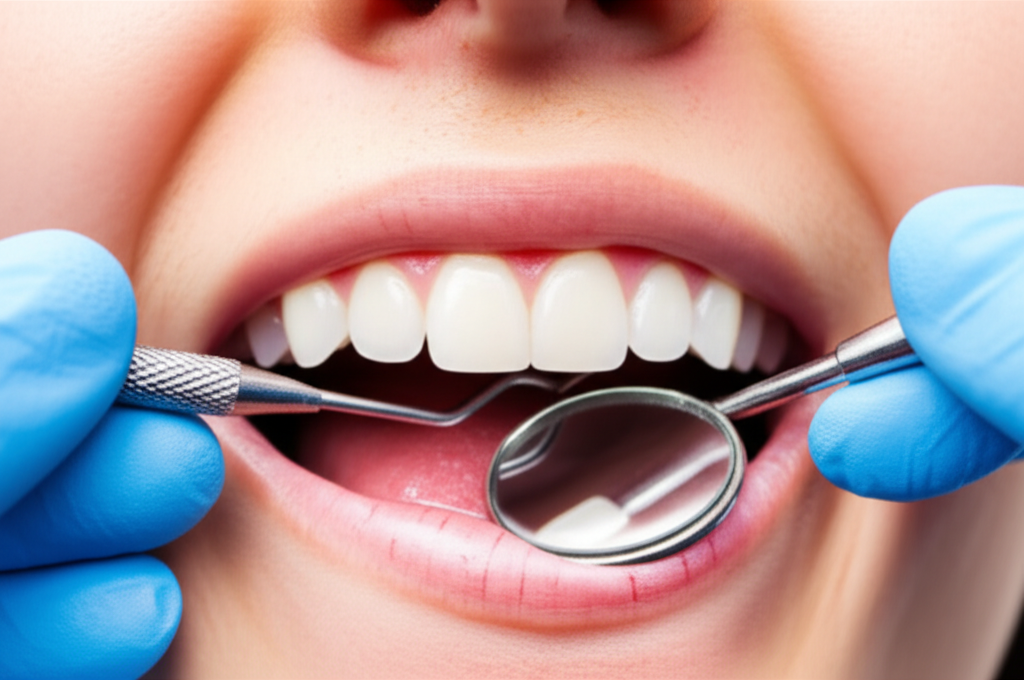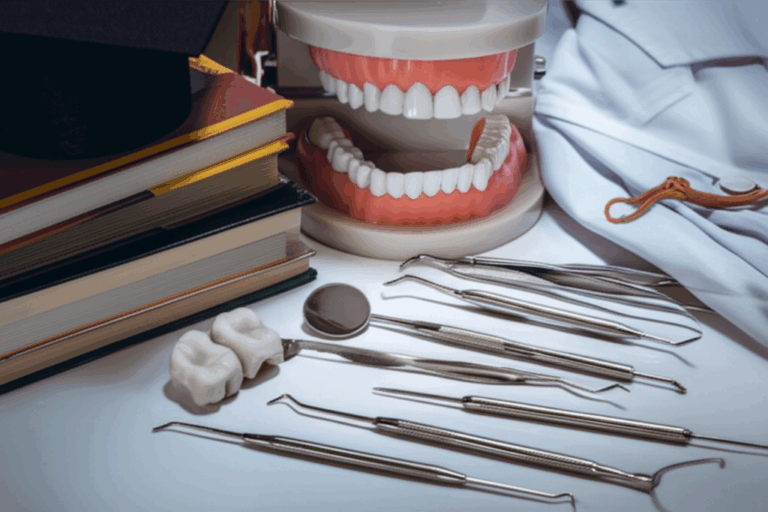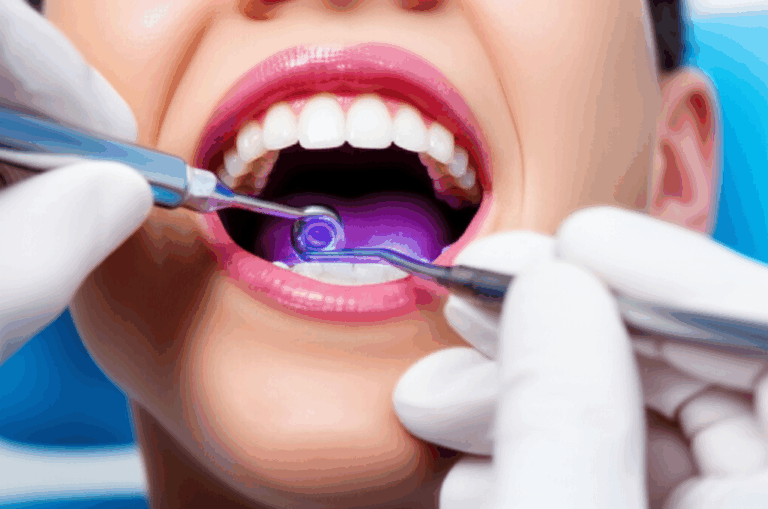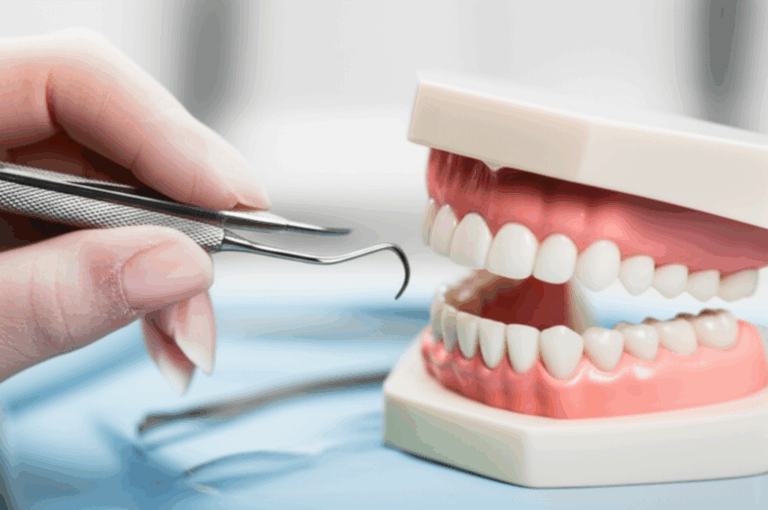
Can Your Dentist Detect Herpes? What You Need to Know About Oral Sores and Dental Care
That nervous feeling you get before a dental visit—wondering, “Will my dentist know if I have herpes?”—is more common than you might think. Maybe you’ve had a cold sore pop up right before your appointment, or you’ve seen a strange sore in your mouth and felt worried. You’re not alone. A lot of people have these questions, and honestly, it’s very normal.
Dentists don’t just check for cavities and bleeding gums. They are trained to see many mouth problems—including signs of herpes. If you’ve ever wondered how much your dentist can really see (and what you should tell them), this guide is here to help.
In This Article
- What Dentists Can Find
- How Dentists Spot Herpes and Other Sores
- Herpes or Another Sore: How to Tell
- Should You Tell Your Dentist You Have Herpes?
- Dental Care When You Have a Cold Sore
- Managing Herpes and Keeping Your Mouth Healthy
- Main Points: Simple, Safe Care
- FAQs About Dentists and Herpes
What Dentists Can Find
So, can a dentist tell if you have herpes? The short answer: Yes, a lot of the time—especially if you have a current sore or get them often.
Dentists look for more than just teeth problems—they also look for things like herpes virus (HSV-1, sometimes HSV-2). They are like detectives for mouth health. At every check-up, they look for blisters, sores, swelling, odd spots—anything unusual.
But here’s some good news: Dentists want to help you, not judge you. Their main job is to keep you and your mouth as healthy as possible.
How Dentists Spot Herpes and Other Sores
Dentists use a mix of looking, asking, and their own experience to tell if a sore is herpes or something else.
1. Looking at Your Mouth
Dentists are trained to see the differences between mouth sores.
- Cold Sores (Herpes): These usually show up as little blisters—often in a group—on the lips or around your mouth. The area might look red and puffy. After a while, the blisters can break and make a crusty, yellowish scab.
- Other Areas: Herpes can sometimes appear on your gums, tongue, the roof of your mouth, or even your throat. These can be harder to spot but still have a certain look.
- Telling Apart from Other Sores: Canker sores, for example, usually happen inside the mouth (not on your lips) and look pretty different. Burns, yeast, or even signs of mouth cancer can sometimes look like other mouth sores, so that’s why dentists use their training to tell them apart.
2. Asking About Your Health
It’s not just what dentists see, but also what you tell them.
- Health Questions: Most dental offices ask about your overall health and if you get cold sores or mouth sores. This helps them know how to take care of you.
- Talking About What You Feel: If you feel a weird tingling or burning before a sore appears, let your dentist know. They hear it all the time and it helps them know what’s going on.
3. Tests (If Needed)
- Strange or Lasting Sores: If a sore looks strange or doesn’t go away, your dentist might suggest taking a small piece for testing, or sending it to a lab.
- Most herpes sores, though, are easy for an experienced dentist to spot just by looking and hearing your story.
4. The Whole Dental Team
Dental helpers and hygienists are trained too. They might notice a sore while cleaning your teeth and tell the dentist.
Herpes or Another Sore: How to Tell
There are lots of mouth sores and it can be confusing. Here’s how you can know the difference:
A. Oral Herpes (HSV-1, Sometimes HSV-2)
- What is it? A virus infection, usually caused by herpes simplex.
- Very easy to catch: Can spread in spit, by kissing, or sharing cups.
- How it looks: Blisters or open spots, usually on your lips or close to your mouth, but sometimes inside.
- Keeps coming back: Cold sores often show up in the same place over and over.
- What sets them off: Stress, sickness, sun, dental work.
B. Canker Sores
- Not catching or from a virus.
- How they look: Small, round sores with a white or yellow middle and a red edge. Often inside the cheeks, on your tongue, or inside your lips.
- Never outside: You won’t see these on your outer lips.
- What causes them: Stress, accidental bites, some foods, not enough vitamins.
C. Other Mouth Sores
- Yeast infections: Like a white, patchy sore.
- Germs: Sometimes look like an ulcer or swelling.
- Injury: Like burns or cuts.
- More serious stuff: Mouth cancer or pre-cancer—see a dentist fast.
Should You Tell Your Dentist You Have Herpes?
Telling your dentist you have herpes can feel weird—but it’s important.
Why You Should Be Honest
- Safer care: Dentists might change your treatment plan if you have a cold sore—maybe waiting until it heals before doing regular work.
- Less chance of spreading it: Herpes spreads easiest when sores are open. Telling your dentist helps protect you and their team.
- Better help: If you often get cold sores, your dentist may talk to you about medicine or how to stop them.
Your Info Is Private
Your dental records—including herpes—are private. Dentists can’t share your info with others. They just want to help.
When to Tell
- If you have a sore right now: You should tell them. They may want to reschedule.
- If you get sores a lot: Tell your dentist, even if you don’t have a sore today.
- If you’re not sure: If a sore looks strange or hurts, ask—dentists can check it out!
Dental Care When You Have a Cold Sore
You made a dental appointment weeks ago, but today you woke up with a cold sore. What now?
A. Why You Might Need to Wait
- Herpes spreads easiest now: When you have an open sore, you can give it to other people, and the dental work might make you feel worse.
- You might spread it in your mouth or to your eyes: If tools or fingers touch the sore and then another part, you could get a new sore somewhere else.
- Infections: Open sores can get infected.
B. When You Need Dental Care Right Away
Sometimes you can’t wait (bad toothache, infection).
- Dentists will use extra care: They’ll use gloves, masks, and extra clean tools.
- Covering the sore: Dentists might use something special to cover the sore while they work.
C. Clean Tools Every Time
- Dental offices always use clean, safe tools and change gloves. They’re careful with everyone, even people without herpes.
Managing Herpes and Keeping Your Mouth Healthy
You can still have a healthy mouth, even if you get cold sores. Here’s how:
A. Talk With Your Dentist
If you keep getting sores or see something new, tell your dentist. They help people with this every day.
B. Medicine for Herpes
- Prescription medicine: Pills like acyclovir and valacyclovir can help sores go away quicker, feel less painful, and make you less catching.
- Creams or pills: Creams help if you use them early, and pills can help if you get a lot of outbreaks or bad ones.
- Ask your dentist if they can write you a prescription or send you to someone who can.
C. Over-the-Counter Help
- For pain: Numbing gel, cold sore stickers, and a cold washcloth can help the pain.
- Lip balms: Protect the sore from getting worse.
D. Easy Self-Care
- Watch out for triggers: Sun, stress, and getting sick can set off sores. Use a lip balm with sunscreen and try to handle stress—maybe exercise or meditate.
- Stay healthy: Eat well, drink water, and stay away from cigarettes and too much alcohol.
E. Keep Seeing Your Dentist
Regular checkups are still super important—even with cold sores. Dentists can keep an eye on your mouth and help stop bigger problems.
Main Points: Simple, Safe Care
Here’s what matters most:
- Dentists can usually see signs of herpes during your visit. Worried? Ask—getting help early is best.
- Being open helps protect you and your dentist. Your info is private.
- If you have a sore, it’s usually better to wait before getting dental work. If it’s an emergency, dentists will use care to keep you safe.
- Most people with herpes can stop sores with medicine, handling stress, and staying healthy. Seeing your dentist regularly keeps your mouth in shape.
Got more questions? Keep reading!
FAQs About Dentists and Herpes
Q: Can a dental hygienist do a cleaning if I have a cold sore?
A: Best to wait if you have a cold sore. Dental work could make it worse or spread it. If it’s urgent, tell the office first—they’ll try to keep you safe.
Q: Can I catch herpes from dental tools?
A: Very unlikely. Dental places clean their tools very well and use new items as needed. You shouldn’t worry about catching herpes there.
Q: Are oral herpes and genital herpes the same?
A: Both are from the herpes virus, but often different types (HSV-1 for mouth, HSV-2 for private parts). Still, you can get either kind in either place.
Q: How long should I wait after my cold sore heals to visit the dentist?
A: Wait until it’s all gone—no more scab or sore. Usually about 7–10 days. If you’re not sure, call your dentist and ask.
Q: Will my dentist be upset if I have herpes?
A: Not at all! Herpes and cold sores are super common. Dentists see them all the time. Being honest makes things better for everyone.
Practical Guide: What to Do Next
Now that you have the facts, here are some easy steps:
- Check your mouth: If you see any odd spots, sores, or blisters, keep track—how often, how long, and what happened before they appeared.
- Be honest with your dentist: Whether at your neighborhood office or a china dental lab, telling the truth gets you the help you need.
- Don’t skip checkups: Regular visits keep your mouth healthy and let your dentist catch anything you might miss.
- Ask about new treatments: Some dental labs and offices now have cool tools for testing or can help with mouth guards or other solutions.
- Find more info: For more help with your teeth and mouth care, check out our practical guide or our patient dental section.
Don’t Worry: Smile with Confidence
Oral herpes is no reason to feel bad. Almost two-thirds of people have this virus by adulthood, and millions will get a cold sore at some point. Telling your dentist about it is a smart move, not a shameful one.
Remember, you deserve kindness and help. Dentists aren’t there to judge—they’re there to help. By being open, knowing the facts, and looking after yourself, you can take care of your mouth easily.
Got worries about a sore or something else? Just ask your dentist. That’s what they’re there for. Teeth, lips, blisters—they can help with it all.
Sources
- American Dental Association (ADA): ADA.org
- World Health Organization: Oral Health Fact Sheet
- Centers for Disease Control and Prevention (CDC): Herpes Simplex Virus Information
(This article is for general information only and doesn’t replace your dentist’s advice.)
Want to know more about dental care and new dental tools? Check out our info on digital dental lab technology and see our practical guide for easy questions about teeth and mouth care.
Quick Recap
- Dentists know how to spot oral herpes by looking, asking questions, and listening to your health story.
- Being honest about cold sores helps you get better, safer care.
- Try to avoid dental visits with open sores unless it’s really needed.
- Medicines, stress relief, and sun protection can help stop or shorten outbreaks.
- Regular checkups and telling your dentist about any problems keep your mouth healthy.
Smile—you’re in good hands!








